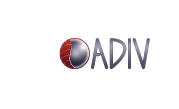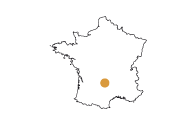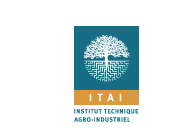Adiv
Association pour le développement de l'institut de la viande
Managing director
Headquarters
ZAC du parc industriel des Gravanches, 10 rue Jacqueline-Auriol
63039 Clermont-Ferrand Cedex 2
Tél. : 04 73 98 53 80
www.adiv.fr
adiv@adiv.fr
Sectors
R&D, auditing, consulting, expertise, and training services for downstream meat industry professionals.
The Adiv Food technology institute has been working with companies, interprofessional organisations and professional federations for more than 50 years. Every day, its multi-species expertise helps improve slaughtering, cutting, processing, curing and packing facilities.
Adiv now operates beyond the meat industry, developing the food industry’s competitiveness in terms of food safety, formulation, product innovation, process development, pre-engineering, industrial transfer, and strategies around the development of consumer surveys and market positioning (focus groups, creativity, etc.)
The Adiv Food technology institute is organised into four teams: Technology & Microbiology, Pre-engineering, Training and R&D, and Markets & Innovation.
Skills
Food safety and microbiology
Process engineering
Quality management and regulations
Formulation and nutrition
Animal welfare
Mechanical engineering and robotics
Engineering
Microbiological and biochemical analysis
Designing training programmes
Human resources
Corporate strategy and economics
Auditing methodology
Plan design
Services
Every year, the Adiv Food technology institute conducts research through partnerships and collaborations, common interest projects and more than 200 bespoke services on behalf of 120 customers.
Technology & microbiology
Challenge trials on products and processes for all food matrices.
Approval of microbiological shelf life.
New product development: clean label products, nomadic products, matured meats, etc.
New process development: Osmofood, steam tunnel decontamination, etc.
Evaluation of the functionality of your ingredients, ferments, and packaging.
Improving the aromatic quality, homogeneity, and specificity of products.
Resolving production incidents (curative and preventive audits).
Recycling of sub-products/co-products and environmental performance.
Pre-engineering
Evaluation of the technical and economic feasibility of a project.
Assisting project sponsors in the different phases of their projects.
Assistance with the acceptance and implementation of processes.
Inventories and evaluation of industrial assets.
Development of innovative tools to improve working conditions and eliminate physically demanding tasks: e.g. with the development of an exoskeleton.
Development of virtual reality learning tools.
360° audits.
Improvement of tools’ overall industrial performance.
Guaranteeing the compliance of tools and practices with health, environmental and animal welfare regulations (CE, health & safety, and classified facilities accreditations).
Obtaining specific health accreditations for your business.
Updating or implementing bespoke plans.
Training
Bespoke internal and external corporate training for meat industry operators and executives: Animal welfare in slaughterhouses, 100% muscle, hygiene and health & safety, dry curing, sharpening and steeling, raw and cooked meat products, slaughtering and cutting techniques, carcass and meat quality.
Auditing and support with human resources.
Beyond the meat industry: R&D and Markets & Innovation activities
Determining market opportunities.
Stimulating creativity to facilitate the emergence of new product ideas.
Defining consumer requirements to establish a product concept.
Formulation with consideration of nutritional, functional, olfactory, regulatory and economic constraints.
Development trials at laboratory scale.
Optimisation of product characteristics (flavour, etc.) and integration of the storage cycle.
Evaluation/proof of compliance of finished products with health and nutritional regulations.
Confirmation of consumer approval of olfactory and social characteristics.
Regulatory labelling and scoring (nutriscore, NOVA, etc.).
Industrial transfer, evaluating industrial requirements and/or scale-up.
Accreditations
Food technology institute (ITAI).
Contracted research structure (SRC).
Qualiopi-certified training entity.
Expertises
Laboratory recognised by the DGAL (French government’s department for food) for:
- assessing growth potential;
- assessing microbiological shelf life (procedure DGAL/SDSSA/2018-82).
The Adiv Food technology institute is:
- listed by the French health insurance authority for professional risk under number 13/2016/Affula/O/274 for its knife-sharpening/steeling training;
- authorised to conduct continuing professional training on animal welfare at slaughter.
Equipments
The Adiv Food technology institute has exceptional facilities for the use of the meat industry:
Full-size, 1000 m² CE-accredited trial platform for meat cutting and processing activities.
- Cutting room.
- Meat curing facilities.
- Packing zone.
- Drying facilities.
- Cooking facilities.
- Refrigeration and freezing facilities.
Robotic cell
P2+ laboratory for the manipulation of pathogens and conducting challenge trials on pathogens.
Chemical, microbiological, and nutritional laboratories.
Contact
Other sites
Numbers of employees
Joint technological unit
Joint technological network
European projects
Scientific partnerships
We continuously develop our expertise thanks to strong scientific partnerships maintained through research partnerships and collaborations, and dedicated tools (Joint Technological Units and Joint Technological Networks).
With French teams
A strong local presence: Ensil-ENSCI Limoges, Inrae Theix, Institut Pascal, Polytech Clermont, Sigma Clermont, University of Clermont-Auvergne, VetagroSup, etc.
At national level: Actia - ITAI & Critt, Anses, CEA, Cirad, École des Mines d’Alès, ENVT Toulouse, Inrae (Jouy-en-Josas, Toulouse, etc.), Institut Pascal (CNRS), SRC, etc.
With international teams
Agricultural University of Athens (AUA), DMRI (Denmark), Fedserv (Italy), Fraunhofer (Germany), HMRI (Hungary), Inran (Italy), Irta (Spain), Nofima (Norway), Spes GEIE (Italy), Teagasc (Ireland), University of Parma (Italy), University of Tananarive (Madagascar), etc.
Project examples
Exploration of low-temperature fermentation to reduce the risk of salmonella in dried meats with reduced nitrite content.
Substitution of nitrites with natural ingredients or antioxidants in cured meats (dried sausage).
Design of an exoskeleton arm to reduce strain on the wrist during cutting and boning activities in the meat industry.
Formulation and texturing of combinations of animal and vegetable protein sources to design multifunctional, sustainable, 3D-printed food products.
Development of a virtual, intuitive, realistic, didactic operational simulator for cutting/deboning meat.
Transfer of OSMOFOOD (continuous drying technology) to all food matrices (fruit, vegetables, fish, dairy products).
Development and finalisation of surface decontamination technologies for meat preparation services using a steam tunnel.
Design of a pedagogical briefcase intended for VSE/SMEs in the slaughtering, curing and meat packing sectors.






